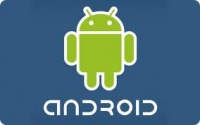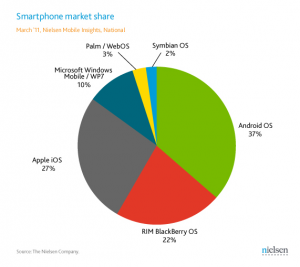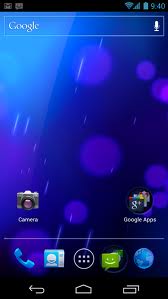Android
Android is an open source operating system for mobile phones, tablet computers, and netbooks developed by Google and the Open Handset Alliance (a group of 84 firms which develop open standards for mobile devices). Many popular mobile devices utilize the Android operating system including the Motorola Droid (series), Samsung Galaxy (series), and HTC Sensation. Google also released a set of mobile devices with the help of HTC and Samsung, such as the G1, Nexus One, Nexus S, and the newly released Galaxy Nexus. Furthermore, the Android operating system is the the best-selling mobile platform with over 200 million users activated as of November 2011.[1] Android OS is based on Linux kernal, with middleware, libraries and APIs written C and allows applications which are compatible with Java.
Contents
History
Android was founded in Palo Alto, California in October 2003 by Andy Rubin, Rich Miner, Nick Sears and Chris White to develop a smarter mobile devices. Android was purchased in August 2005 and Google marketed the platform to handset makers and carriers on the basis that it was a flexible system that could be easily upgraded.[2] Android has been through multiple updates since its first release. The most recent version, 4.0 Ice Cream Sandwich was announced on October 19, 2011. Android source code is available under free and open source software licenses and Google's Linux kernel is available under the GNU license. [3][4]
Open Sourcing and Patenting, Control Issues
The Android Operating System is powerful and accomplishes many technological tasks and benchmarks with relative ease. The release of Android's open source code under a free software licensing system called Apache has allowed third party programmers to manipulate, revise, and innovate new applications for the Android Operating System and Android mobile markets. The open sourcing of Android's operating system lets programmers and developers tweak and make changes to Android's specifications.
While the community of developers working on Android has produced revolutionary applications for Google's growing share in the mobile market, the conflict of ownership and patenting will become more of a problem. For example, the Android OS's ability to hold multi-core processors allows for advanced program capability, storage, and availability. If a developer were to enhance the processing ability of Android 2.2, would Google have a patented share or would the developer have full control and ownership? Third-party developers are beginning to wonder though whether or not their programs and applications will be unique and owned by the creator, or if Google will authorize a policy in which they can patent or control a share of all profits from third party development of Android Operating System programs and applications.
On August 15, 2011, Google acquired Motorola Mobility for 12.5 billion USD. The acquisition included more than 17,000 issued Motorola patents and another 7,000 pending.[5] The sizable portfolio of patents will help protect Google's business from other competitors, such as Apple, and put Google in a position to be on the offensive.[5]
Compatibility, Special Features, and Multi-Tasking
Google Android Operating System's success has been based on the fact that it is seemingly compatible with multiple platforms and able to operate to full capacity seamlessly. The ability of Android OS to multi-task (e.g. read pdf documents, surf the Internet, and play music) and bring 4G all while maintaining full capability as a mobile phone is what has made Android so popular. It stands as the prime competitor to Apple's iPhone in the smartphone market. The fact that Android is controlled by core libraries programmed in Java allows for a community of developers and programmers to aid Google in maximizing Android's compatibility, usage, multi-tasking and ability to release constant updates and improvements. Because of the release of the source code to several developers, Frank Feinbube, Professor of IT Systems and Engineering at the Hasso Plattner Institute believes:"Android is setting the standard for mobile devices and will only improve with features such as SQLite for relational data storage, Bluetooth and wireless capability, ability to include data sharing between applications, and run multiple core libraries efficiently." [6] pp. 1-23Android features an integrated browser and media support for audio and video in several formats including MPEG4, MP3, AAC, AMR, JPG, PNG, and GIF. The ability to switch between 3G and 4G internet is also an attractive aspect of smartphones containing Android operating systems. It allows users the flexibility to switch between hardcore internet usage, and simple tasks such as checking the weather or e-mail. Overall, Android's many functions and near flawless performance will place it as a software platform and operating system for mobile devices for years to come.
Applications
Android Market
An online software store created by Google in 2008, the Android Market features a variety of applications organized around Apps, Games, Music, Books, and Movies. The market is not open source and the developers of the apps receive 70% of the profit, with the remaining 30% going to carriers and payment processors [7]. Developers in 29 countries may place applications on the market, while users from 131 countries may purchase and use the applications [8].
Ethical Concerns
The Android Market causes a potential security threat for users in that they may purchase applications that contain viruses. In 2011, the application DroidDream was released to the market and this application allowed hackers to access personal information on the infected phones[9]. The market's use of anonymity promotes this type of behavior by decreasing the chance that the hackers will be identified and thus decreasing the chances that the hackers will be held accountable for their actions.
"Patent Wars"
Many smartphone manufacturers use Google's Android technology as the operating system for their devices. As a result, many smartphones currently on the market run very similar, if not identical operating system software. The competitive nature of the smartphone market has led to different software patent owners suing phone manufacturers for infringing on patents via the software that they ship on their phones.
The "open" nature of Android's technology has made Android phone manufacturers easy targets for those looking to gain on patent infringement. Apple, inc. has filed multiple patent infringement claims against Android phone manufacturers, with company founder Steve Jobs going to far as to characterize Android as a "stolen product[10]." These claims happened to occur while Android's smartphone marketshare was in a state of rapid growth[11] If these lawsuits begin to gain any traction in the courts, it may set a precedent against open source software because any implementation of the software could potentially be negated by a patent infringement claim in one of the thousands of patents that a smartphone contains. There is an imminent threat of the International Trade Commission, a US federal agency, banning the import of devices that run on Android operating systems[12].
Open Source
Android saw a quick rise to popularity not only because of its creator, Google, but also through its open source nature. The code is "open" for use by anyone to use and re-implement. This non-proprietary nature differentiates it from the popular Apple AppStore. The AppStore is extremely careful in allowing apps to be sold in its domain. This causes much grief among developers who complain Apple is not reasonable with its responses but ultimately leads to a more elitest store; only well-developed apps are allowed entrance. The Android market-place is much more liberal in its allowances. In fact, it has almost no restrictions for its entrants. The few things it cares about are listed here:
1. Sexually Explicit Material
2. Violence and Bullying
3. Hate Speech
4. Impersonation or Deceptive Behavior
5. Personal and Confidential Information
6. IP Infringements
7. Illegal Activities
8. Gambling
9. Malicious Products[13]
The Apple AppStore restrictions are very exhaustive and cover thousands of restrictive policies. This delineation between the two has led to polarized content. Android sports an explicit market of applications that bend the rules. Its content is also not quite as refined as that of Apple's and its applications tend to be a bit less stable.
Google, in as much as one can own an open-source project, "controls" Android development and determines its upcoming features. Because of this relationship, some features are pushed to the Android system before any other markets get access. For example, Google Voice, a popular VoIP service was exclusively offered on the Android Marketplace. More recently, Google has launched a new, indoor, map system that enables users to view the layout of buildings to more easily navigate to their destination. There is currently no set date to push this feature to the Apple AppStore.
Another differentiating factor about its open-source nature and relationship with Google is is inter-operability. The Android Operating System has multiple formats for different devices and can be used by many different carriers on many proprietary devices.
Google Voice
Google Voice is a very revolutionary product that has caused much controversy. It sports a free VoiP service that allows users to take on a wholly new number (or keep their own for $20). Android and Google Voice integration is extremely powerful and has allowed many users to bypass a significant portion of their carrier charges. Although many companies have complained about this, it is still profitable to use the Google Android Operating System, a system that is increasingly rivaling Apple's iOS.[14]
Google - Unethical Actions
While Android is supposed to be completely Open Source Google as of October, 2011 Google had not openly released source for Android 3.0 and it had also infringed on GPLv2 that Linux kernel used in Android was released under. Basically, earlier versions of Android used a library of C classes which were protected under GPLv2 however,this negatively effected developers of Android apps as they would have to make their source code public so Google created their own C classes instead. Situations like these where Google is taking steps to ensure longevity of their product but not properly complying with Open Source practices is ethically wrong. [15]
Version History
| Version Number | Version Name | Released Date |
|---|---|---|
| 1.0 | Android 1.0 | September 23, 2008 |
| 1.1 | Android 1.1 | February 9, 2009 |
| 1.5 | Cupcake | April 30, 2009 |
| 1.6 | Donut | September 15, 2009 |
| 2.0 | Eclair | October 26, 2009 |
| 2.2 | Froyo | May 20, 2010 |
| 2.3 | Gingerbread | December 6, 2010 |
| 3.0 | Honeycomb | February 22, 2011 |
| 4.0 | Ice Cream Sandwich | October 19, 2011 |
See Also
External Links
Citations and References
- ↑ Arthur, Charles. Mobile generating equivalent of $2.5bn a year, says Google chief. Guardian. 2011-10-14. Retreieved 2011-12-16.
- ↑ Elgin, Ben. Google Buys Android for Its Mobile Arsenal. Bloomberg Businessweek. 2005-08-16. Retrieved 2011-12-16.
- ↑ Android (operating system). Wikipedia. Retrieved 2011-10-14.
- ↑ Licenses. Android Open Source Project. Retrieved 2011-12-16.
- ↑ 5.0 5.1 Mclean, Mike. Google and Motorola - A match made in patent heaven? EDN. 2011-09-15. Retrieved 2011-12-16.
- ↑ Feinbube, Frank. "Android: Operating Systems and Middleware." Hasso Plattner Institute, IT Systems and Engineering, 17 November 2011. Web. 11 December 2011.
- ↑ Eric Chu (22 October 2008). "Android Developers Blog: Android Market: Now available for users". Android Developers Blog. Retrieved 12 December 2011.
- ↑ "Supported locations for merchants". Android Market Help
- ↑ "The Mother Of All Android Malware Has Arrived: Stolen Apps Released To The Market That Root Your Phone, Steal Your Data, And Open Backdoor | Android News, Reviews, Apps, Games, Phones, Tablets, Tips, Mods, Videos, Tutorials". Android Police. Retrieved 12 December 2011.
- ↑ http://www.google.com/url?sa=t&rct=j&q=&esrc=s&source=web&cd=1&ved=0CCcQFjAA&url=http%3A%2F%2Fwww.zdnet.com%2Fblog%2Fbtl%2Fsteve-jobs-android-a-stolen-product%2F61504&ei=CcXpTs6OH8iqgwevztWSCQ&usg=AFQjCNEsDAd35vHRgqLvKnxLOk1-02RdXA&sig2=H6OA6LznDsKiH6Xzm3G3bA
- ↑ http://online.wsj.com/article/SB10001424052970204826704577074523539966352.html
- ↑ http://online.wsj.com/article/SB10001424052970204826704577074523539966352.html
- ↑ http://www.android.com/us/developer-content-policy.html
- ↑ https://www.google.com/voice/b/0#inbox
- ↑ http://brookersection203.blogspot.com/



